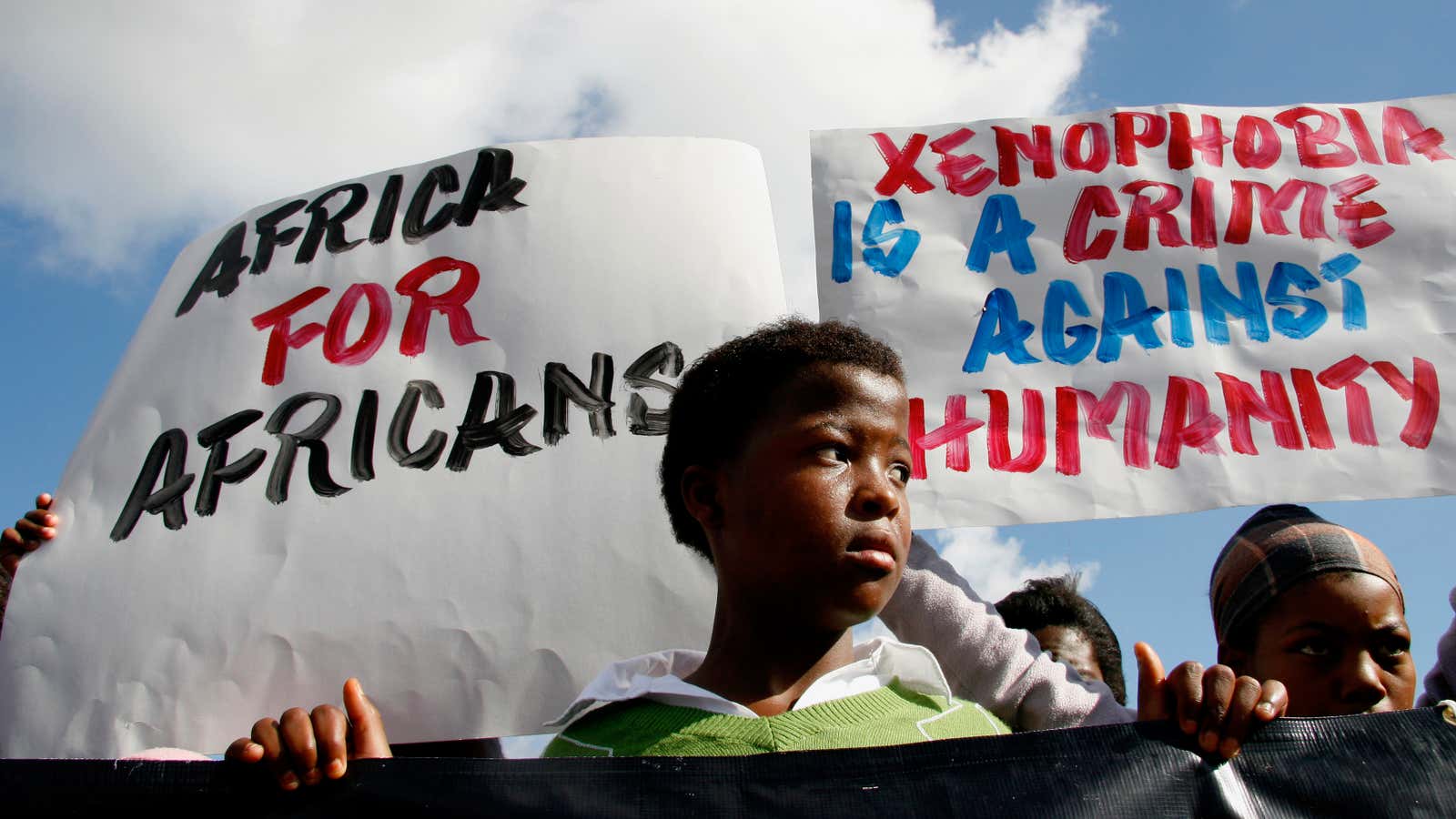Xenophobic violence has erupted in South Africa again, in a cycle that is now being fueled by politicians ramping up anti-immigrant rhetoric in a country where foreigners are easy targets.
Last week, Malawians living among South Africans in a squatter camp on the outskirts of Durban were attacked by their neighbors. More than 100 crowded into a police station for protection and were eventually housed in a tent in an open field. Unconfirmed reports said two people were killed.
The latest attacks were vigilantes who were said to have found a Malawian man with stolen goods. Over several days, Malawians in the settlement were targeted as retribution. Calm was restored by Apr. 1, after South Africans officials intervened, the local Islamic Society and other NGOs negotiated and the Malawian community of Durban had to write a letter apologizing on behalf of one man, according to a statement from the mayor’s office. No arrests were made.
Elias Twaibu barely survived the 2015 attacks in Durban in which several people were killed. The 30-year-old went back home to Malawi, but that country’s economic straits drove him back to South Africa, where was again attacked last week.
“Coming back to a country that stripped me of my dignity became my only option,” he told the Sunday Tribune, Durban’s local weekly. “I was so desperate and impoverished that I came back here. It’s a decision I truly regret making.”
The attacks aren’t usually targeted against one nationality, with Somalis, Congolese, Mozambicans, Nigerians and Zimbabweans all bearing the brunt throughout the last decade of anti-immigrant violence.
The 2015 attacks were fueled by comments made by Zulu King Goodwill Zwelithini as he flexed his political muscles. This time, the thread may not seem as direct, but the attacks come after weeks of anti-immigrant rhetoric by South African politicians. On Monday (Apr. 1), president Cyril Ramaphosa condemned the attacks, reminding South Africans that they owe their African neighbors a debt of gratitude for their support during the struggle against apartheid. Yet, just days earlier, Ramaphosa himself scapegoated foreigners while on the campaign trail.
“Everybody just arrives in our townships and rural areas and set up businesses without licenses and permits. We are going to bring this to an end,” he said at a rally.
As the ANC government struggles to provide basic services, they have blamed foreigners for burdening the public service. In November last year, health minister Aaron Motsoaledi said the health service was collapsing in part due to “the weight that foreign nationals are bringing to the country.” He defended his comments, saying it had “nothing to do with xenophobia, it’s a reality.”
That’s the same line taken up by the official opposition, the Democratic Alliance. “Securing our borders,” has become a key part of their election manifesto, blaming the ANC for “failing” immigration policies. They’ve linked immigration to their main campaigning points, job creation and crime.
“Johannesburg attracts more than 3,000 people every month and not all of those people are registered,” said DA leader Mmusi Maimane, calling for more secure borders and taxes on foreign-owned businesses. It’s worth noting that Maimane and the DA’s policy zero in on inner-city Johannesburg and Pretoria, home to many African immigrants, and not Cape Town, a DA stronghold and a favorite of expats, code for white immigrants.
“The biggest challenge is that people don’t have work here,” he added. “The other issue that is becoming problematic is that our citizens don’t feel safe.”
It’s an immigration strategy Johannesburg mayor Herman Mashaba has employed more blatantly and much longer, blaming foreigners for urban decay. When finally providing low-income housing, Mashaba ensured that they were only to be occupied by South Africans, potentially splitting up mixed families. Smaller parties who want to be noticed have adopted the same prejudice as policy.
In 2008, more than 60 people were killed attacks on foreigners, and since then this violence has never quite disappeared. Fuelled by economic insecurity, these attacks are mostly perpetrated by black South Africans target African migrants, the vulnerable attacking the most vulnerable. That this hatred is now being picked up by politicians is cynical, and terrifying.
Sign up to the Quartz Africa Weekly Brief here for news and analysis on African business, tech and innovation in your inbox
